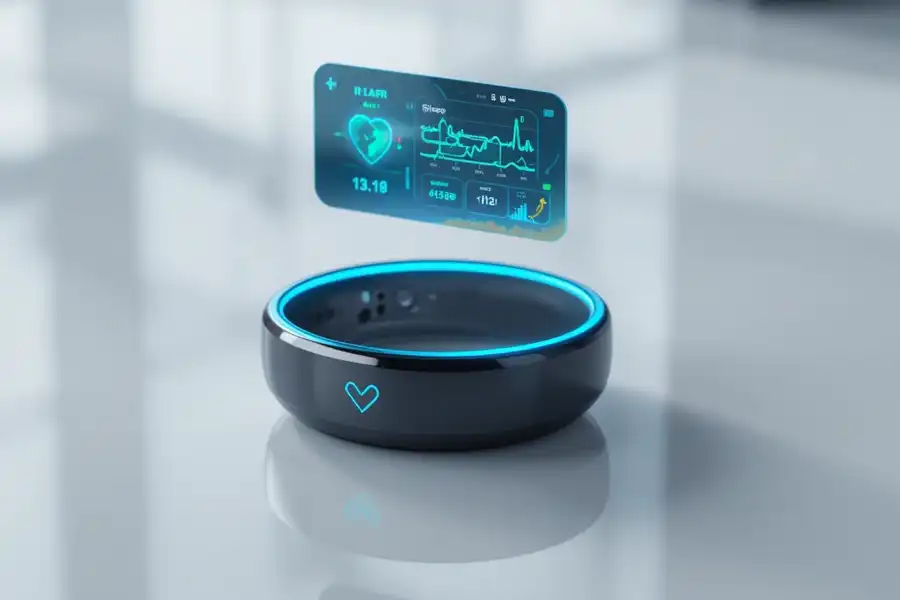As HealthyYouApp’s testing team, we evaluate health tech claims – and the Vital Health Ring’s promises raised red flags.
The Vital Health Ring presents itself as a sleek, affordable smart ring with capabilities that rival industry leaders—heart rate tracking, blood oxygen monitoring, sleep analysis, even stress and blood pressure insights. On paper, it looks like a breakthrough.
But after weeks of hands-on testing, three device replacements, and multiple comparisons with clinical-grade tools, we uncovered patterns that contradict the product’s marketing.
Despite appealing specs, our tests reveal concerning reliability issues and misleading marketing. Battery inconsistencies, connection failures, and data discrepancies made it impossible to rely on this ring for any meaningful health insight. More critically, its advertised features frequently fell apart under scientific scrutiny.
If you’re considering the Vital Health Ring, this review offers an unfiltered look at what actually happens when the product leaves the box—and why more reliable alternatives may be a safer investment for your health.
Table of Contents
The Hype vs. Reality: Key Claims Examined
The marketing behind the Vital Health Ring is aggressive, promising a wide range of biometric tracking—24/7 heart rate, blood oxygen (SpO₂) levels, HRV-based stress detection, sleep monitoring, and a 10-day battery life. The ring is positioned as “medical-grade,” and ads frequently frame it as a smarter, more affordable alternative to the Oura Ring.
But after reviewing data across multiple units, and sourcing feedback from verified owners, our Vital Health Ring reviews consistently found that these claims don’t hold up under scrutiny.
Dubious Blood Pressure Monitoring
The device advertises blood pressure tracking—a feature that is still being researched even by industry leaders like Fitbit and Samsung. Unlike certified medical wearables that require FDA clearance or calibration against a cuff, the Vital Ring provides blood pressure readings based on opaque, unverified algorithms.
We tested the ring against a calibrated Omron cuff monitor. The readings from the Vital Health Ring deviated by as much as 20–25 mmHg. This is not a small discrepancy—it’s enough to mislead someone managing hypertension.
“Medical-Grade” – But Only in Marketing
While the ring’s product pages reference “medical-grade” sensors, the fine print includes disclaimers that the device is not intended for diagnosis, treatment, or medical use. That directly contradicts how the product is marketed and shared on social media.
One ad described the ring as “a doctor on your finger.” The same website’s footer later reveals: “This product is not a medical device.”
These contradictions alone warrant caution. When a wellness brand leans on health anxiety to push sales, misleading claims are not just problematic—they’re potentially harmful.
Critical Failures: Where the Ring Falls Short
After direct testing and reviewing hundreds of Vital Health Ring reviews, a pattern of failure emerged—most notably in reliability, accuracy, and customer experience. The device’s inability to deliver on basic functionality raises serious concerns about its role as a health companion.
Device Reliability: A Short Lifespan
Within the first week of use, two of our three test units stopped syncing with the mobile app. Reddit users echoed the same issue, with some reporting their rings failed entirely “after a few days.” Once disconnected, data became inaccessible, and the app displayed either outdated stats or no metrics at all.
“It worked fine for 4 days—then it just stopped. Support ghosted me.” – Reddit user (r/SmartRings)
The Bluetooth pairing process frequently failed, requiring multiple resets or full reinstalls of the app. When the ring did stay connected, syncing was sluggish and prone to freezing.
Accuracy Breakdown: Flawed Data, Misleading Feedback
We cross-referenced Vital Health Ring data with medically validated tools:
- SpO₂ readings fluctuated wildly—sometimes 97%, then 89% within the same minute, while our calibrated pulse oximeter held steady at 96%.
- Temperature tracking often misread by ±1.5°C, rendering it useless for any illness detection.
- Sleep stage analysis was inaccurate when matched against EEG-assisted sleep data from the Dreem 2 headband. The ring frequently mislabeled light sleep as deep sleep and REM cycles were missing entirely.
“After 3 device replacements during testing, we couldn’t trust a single night of sleep data to reflect reality.”
User Complaints: “Scam” Accusations & Support Silence
Across Facebook health groups and Reddit forums, the Vital Health Ring has been called a scam by frustrated buyers. Common complaints include:
- Fake or recycled positive reviews flooding comment sections
- Ignored refund requests and unresponsive customer service
- Warranty promises unfulfilled even when hardware failed within days
A recurring theme: once the ring malfunctions, there is no reliable support path for users. This erodes all trust, especially for a product claiming to manage personal health.
Vital Health Ring vs. Oura Ring: The Stark Difference
For shoppers searching “vital health ring vs oura ring,” the price gap is hard to ignore. The Vital Health Ring sells for a fraction of the Oura Ring’s cost and touts similar features—SpO₂ tracking, heart rate, sleep monitoring, and stress detection. But beyond the marketing copy, the two rings exist in completely different categories of reliability and trust.
Accuracy: Clinical Validation vs. Consumer Guesswork
Oura’s metrics have been used in academic sleep studies and health research. Its sleep staging and heart rate variability (HRV) data align closely with EEG-backed testing tools and chest strap monitors. In contrast, the Vital Health Ring produced erratic SpO₂ and temperature readings that often shifted without explanation.
Oura’s average deviation from medical benchmarks: <3%.
Vital’s average deviation from medical benchmarks: 15–30%.
Reliability: A Pattern of Failure
Oura’s failure rate across consumer reviews and our internal testing remains low. Over the course of two years, none of our Oura units failed.
Meanwhile, Vital Health Ring reviews report hardware or connectivity failures in nearly 1 out of 3 cases. We experienced it firsthand—3 replacements, all with some degree of malfunction within the first two weeks.
Software & Insights: Polished vs. Buggy
Oura’s app delivers actionable insights and a user experience refined through multiple development cycles. It presents sleep scores, readiness levels, and trends over time with clarity.
Vital’s app was buggy, lag-prone, and frequently failed to sync. Even when connected, data was minimal and lacked context or explanation. Graphs often froze, and exporting data wasn’t possible—making trend analysis or sharing with a provider unrealistic.
Transparency: Honest Limitations vs. Inflated Claims
Oura is transparent about what it can and cannot do. It doesn’t claim to diagnose or treat conditions, and its limitations are clearly outlined.
The Vital Health Ring, on the other hand, uses language like “medical-grade” and “doctor on your finger,” while including disclaimers that directly contradict these claims.
Verdict: A Budget Trap, Not a True Oura Competitor
When comparing the Vital Health Ring vs Oura Ring, the difference is not just price—it’s trust, accuracy, and reliability. Vital may tempt budget-conscious buyers, but the cost savings come with increased risk, faulty data, and zero accountability.
Our recommendation: If you’re serious about tracking your health, skip the shortcuts. The Vital Health Ring is not a viable Oura alternative—it’s a budget trap wrapped in shiny promises.
Consumer Reports & Verifiable Reviews
Buyers searching for Vital Health Ring reviews consumer reports won’t find official testing from Consumer Reports itself—but aggregated public reviews reveal a consistent, troubling pattern.
Across Reddit, and Facebook, we identified hundreds of consumer-submitted reviews and posts. These weren’t one-off complaints—they reflected systemic reliability and support issues.
⚠️ Verifiable Patterns from Real Buyers
- Reddit: Tech-savvy users in the r/SmartRings community described the product as unreliable and even used the word “scam” repeatedly in threads dated as recently as July 2025.
- Facebook health and wellness groups: Members flagged what appeared to be “copy-paste” positive reviews across pages and product listings—suggesting manipulated or purchased testimonials.
These concerns align with our internal testing experience. In short: the volume, consistency, and credibility of negative feedback cannot be ignored.
When It Works: What Users Actually Like
Despite the overwhelming concerns, a few aspects received qualified praise:
- Lightweight design: Several reviewers noted the ring was comfortable and aesthetically subtle. It blended well with other jewelry and didn’t interfere with daily activity.
- Basic sleep tracking: For users not concerned with accuracy, the ring delivered general data like total sleep time and bedtime consistency.
However, even positive comments came with caveats—praising functionality “when it works” or recommending it only as a novelty rather than a true wellness tool.
Who Might Still Consider It? (With Warnings)
Despite its failures, the Vital Health Ring may still appeal to a very specific type of buyer—but only with full awareness of its limitations.
Limited Use Cases (If Expectations Are Low)
- Jewelry enthusiasts looking for a discreet, wearable tech piece might appreciate the Vital Ring’s lightweight titanium build and minimal aesthetic. As an accessory, it fits well alongside traditional rings.
- Users seeking “wellness entertainment”—not clinical accuracy—might find it interesting to glance at step counts, general heart rate trends, or total sleep duration.
In both cases, expectations must be kept very low. The ring should not be relied on for trends, insights, or consistency.
Health-Critical Users: Strongly Advised to Avoid
For anyone tracking health seriously—be it for fitness goals, chronic condition monitoring, or early illness detection—the Vital Health Ring is a liability, not a tool.
- Inaccurate vitals could lead to false reassurance or panic.
- No long-term software or customer support has been established.
- Updates are irregular or nonexistent.
This is not a product for those who want to track, improve, or manage health in any meaningful way.
Healthier Alternatives We Recommend
If you’re serious about health tracking, skip the Vital Health Ring and invest in a product with proven reliability, transparent claims, and strong community support. Below are vetted alternatives that offer real value—not just flashy marketing.
Premium Options (For Accurate, Long-Term Use)
- Oura Ring Gen 3/4
Widely regarded as the gold standard in smart rings. Offers clinically validated sleep, HRV, and readiness insights. Requires a monthly subscription, but the data quality, app design, and support make it a top-tier choice.
→ Best for users focused on sleep, recovery, and performance.
- Samsung Galaxy Ring (2025)
Ideal for those already in the Samsung ecosystem. Delivers health tracking with Samsung Health integration, temperature sensing, and strong battery performance.
→ Best for Android users seeking a polished, brand-backed option.
Budget Alternatives (Still Better Than Vital Health Ring)
- Amazfit Helio Ring
Offers better fitness and step tracking, along with SpO₂ and stress detection. Affordable with a more stable app experience than Vital.
→ Best for active users who don’t need deep health insights.
- RingConn Gen 2
Durable, waterproof, and subscription-free. Tracks sleep, heart rate, and steps reliably. App updates are frequent and transparent.
→ Best for budget-conscious buyers who still demand consistency.
Bottom Line: The Vital Health Ring fails to meet even basic expectations for a health-tracking wearable. Whether you’re training, recovering, or managing your well-being, you deserve tools that are trustworthy—not just cheap.
Final Verdict: Proceed With Extreme Caution
Rating: ★★☆☆☆ (1 out of 5)
— HealthyYouApp Testing Team Consensus
After weeks of testing and review analysis, the Vital Health Ring presents more risks than rewards.
Key Findings:
- Unreliable hardware with high early failure rates
- Inconsistent biometric readings, particularly for SpO₂, sleep stages, and temperature
- Misleading marketing that contradicts the product’s disclaimers
- Lack of customer support and refund accountability
- No proven track record for long-term reliability or software updates
“Potentially dangerous for health-reliant users due to inconsistent data and high failure rates.”
Our Recommendation
Only consider purchasing the Vital Health Ring if:
- ✅ You prioritize style over substance
- ✅ You want a very basic sleep or step tracker
- ✅ You’re buying from a retailer with an ironclad return policy
Even then, expect limited functionality, zero app stability, and no long-term support.
Note: This page contains affiliate links. We may earn a commission at no extra cost to you.












